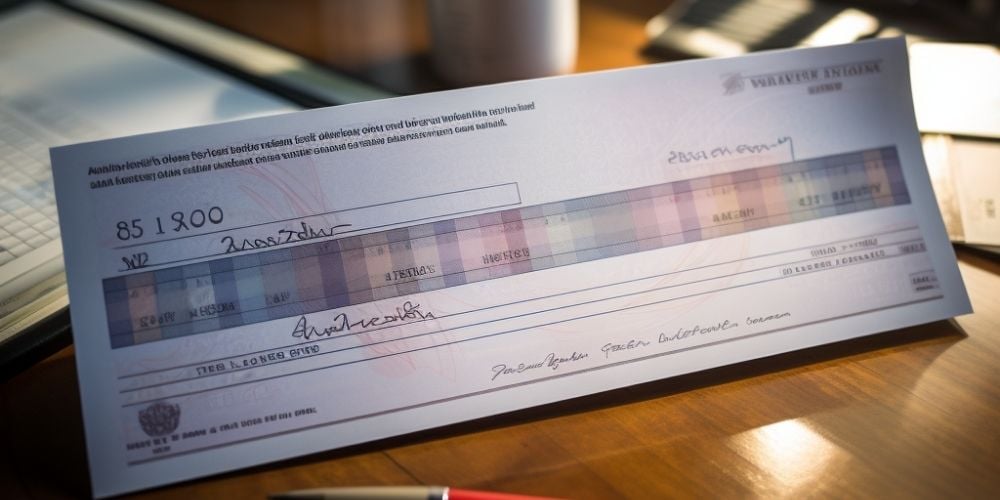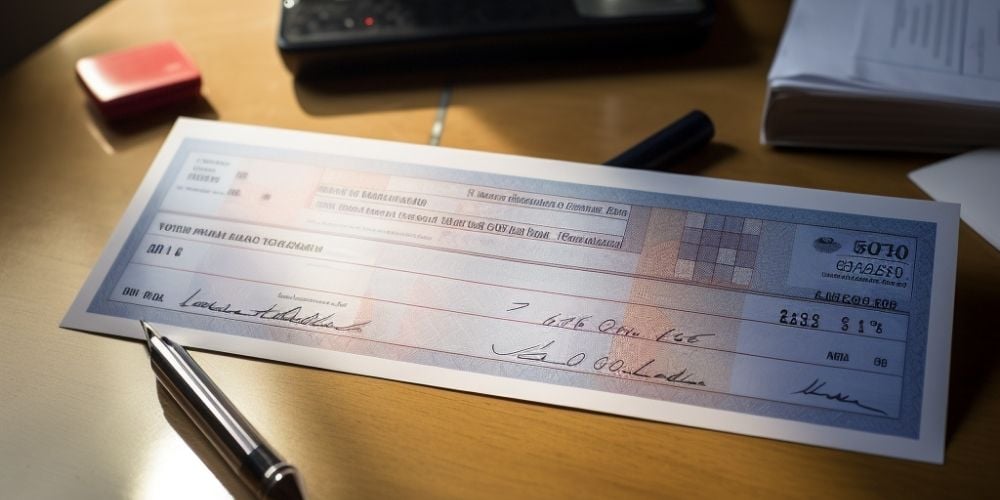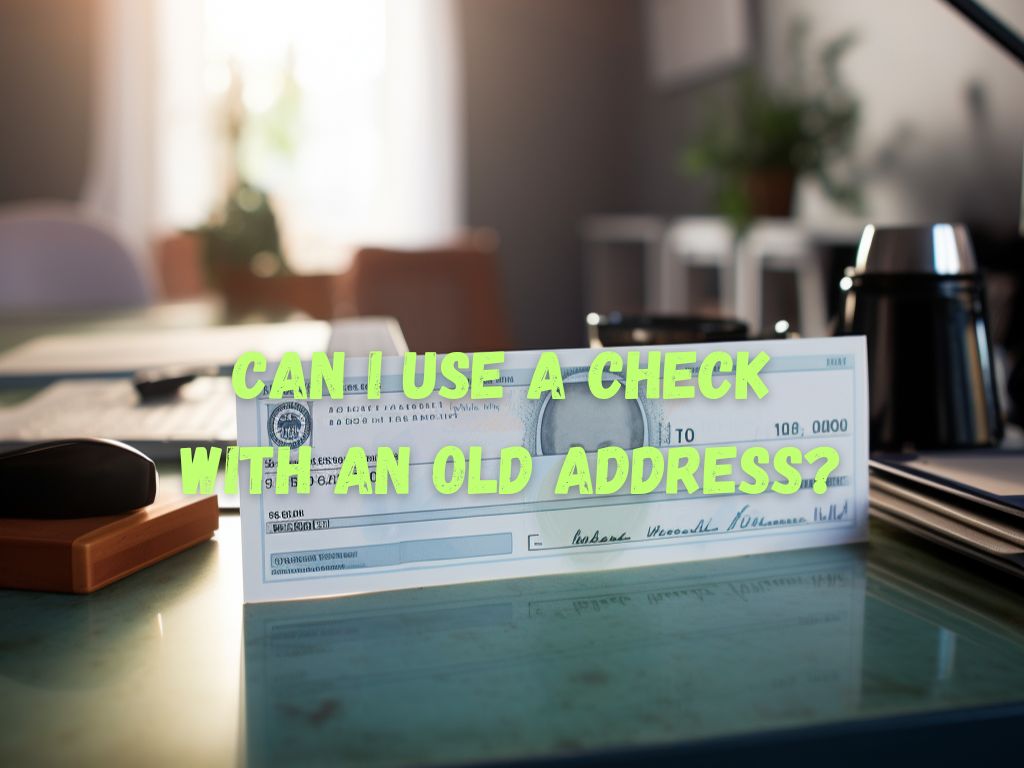Do you have a stack of blank checks with your old address lying around? Don’t let them go to waste!
You can still use check with an old address, but there are some important things to consider.
In this guide, we’ll explain the process of updating your check address, the legal implications of using a check with an old address, and some pro tips for using checks with outdated information.
Can I Use a Check with an Old Address?
Yes, you can still use a check with an old address if the recipient accepts it. However, it’s recommended to update your address information on the check to avoid any potential issues or complications.
There are several factors to consider before deciding to use a check with outdated address information.
Recipient Acceptance
The acceptance of a check with an old address ultimately depends on the recipient. Some may be more understanding while others may view it as suspicious or refuse to accept the check.
It’s crucial to communicate with the recipient beforehand to explain the situation and ensure their willingness to accept the check with the outdated address.

Time Limitations
Even if the recipient accepts the check, there might be time limitations associated with using a check with an old address.
For example, some institutions may have policies that require checks to be used within a certain time frame from the issue date. Check with the recipient and your bank to determine if any time constraints apply.
Updating Address Information
Although using a check with an old address is possible, it’s advisable to update your address information to avoid potential complications.
Updating your check with your current address ensures accuracy and minimizes any suspicion or issues that may arise. It’s best to proactively update your address to maintain the highest level of accuracy on all financial documents.
Individual Circumstances
Consider your individual circumstances and the risk tolerance involved.
If you’re confident in the integrity of the transaction and have a valid reason for using a check with an old address (such as a recent move), you may decide to proceed.
However, it’s important to weigh the potential risks against the benefits and adopt a cautious approach.
How to Update Your Address on a Check
The first step in using a check with an old address is to update the address information on the check. Here’s how to do it:
Step 1: Understanding the Process
Updating your address on a check is a simple process, but the specific steps may vary depending on your bank. Typically, you’ll need to contact your bank to request an address update on the account linked to the check.
Step 2: Contact Your Bank
To update your check address, reach out to your bank’s customer service team. You can typically find their contact information on the bank’s website or on the back of your debit or credit card.
Be prepared to provide your personal information and the reason for your request.
Step 3: Submit Updated Information
After requesting an address update, your bank may require you to submit updated information through a secure form or in person at a branch location.
When submitting your updated information, make sure to double-check for accuracy.
Step 4: Confirm the Changes
Once your bank has updated your address, confirm that the changes have been made to the account linked to your check before using it.
This will help avoid any potential issues or complications related to using a check with outdated information.

Legal Implications of Using a Check with an Old Address
Using a check with an old address may not be illegal, but it can have potential legal implications and risks.
It’s essential to understand these implications before deciding whether to use a check with outdated information.
Risk of Fraud
One of the primary concerns when using a check with an old address is the risk of fraud.
If the recipient of the check notices the outdated address and suspects fraudulent activity, they may refuse to accept the check or report the issue to law enforcement.
Even if you have legitimate reasons for using a check with an old address, it’s important to be aware that others may view it as suspicious.
Incorrect Information on Bank Statements
Using a check with outdated address information can lead to incorrect details on your bank statements.
This can make it challenging to track and reconcile your finances accurately. It’s crucial to keep your financial records updated with your current address to ensure the correctness of your statements.
Potential Legal Liabilities
While using a check with an old address may not result in immediate legal consequences, it can potentially lead to liabilities.
If there are any disputes or legal issues related to the transaction, having outdated address information on the check could complicate matters. It’s important to maintain accurate and up-to-date information on all financial documents to avoid unnecessary legal complications.
Consideration from Financial Institutions
Financial institutions often prioritize security and may scrutinize transactions involving checks with outdated information more closely.
This heightened scrutiny is to protect against fraudulent activities.
Therefore, while it may not be illegal to use a check with an old address, the transaction could raise suspicions and necessitate extra verification steps by the bank or recipient.
Frequently Asked Questions
What If I Have Already Written a Check with the Old Address?
If you’ve already written a check with the old address, there’s no need to panic. The check may still be accepted if the recipient does not notice the outdated information.
However, it’s recommended to update your address information on the check for future transactions.
Are There Any Consequences for Using a Check with an Old Address?
Potentially, yes. Using a check with an old address can lead to issues related to fraud, incorrect information on bank statements, or potential legal liabilities. It’s important to keep all financial documents up-to-date to avoid these issues.
Pro Tips for Using Checks with Old Addresses
Here are some pro tips for using checks with old addresses:
Regularly Update Your Address on All Financial Documents
To maintain accurate records and avoid potential complications, make it a habit to update your address on all financial documents, including checks.
This practice ensures consistency across various platforms and helps prevent confusion or suspicion.
Use Electronic Checks as an Alternative
Electronic checks, often referred to as eChecks, offer a secure and convenient alternative to traditional paper checks.
With eChecks, you can process transactions quickly and efficiently without the need for physical checks.
They also provide an opportunity to include updated address information automatically, eliminating concerns about outdated addresses.

Verify Recipient Information Before Issuing a Check
Before issuing a check, take the time to verify the recipient’s information. Double-check for accuracy, including their current address.
Verifying recipient information helps prevent any potential issues that may arise due to outdated or incorrect information.
Communicate with Financial Institutions
If you anticipate using checks with an old address regularly, consider informing your bank about your situation.
They may provide guidance or suggest specific measures to ensure smoother transactions. Being proactive in your communication can help minimize potential complications.
Maintain a Documentation Trail
Keep detailed records of any transactions involving checks with an old address. This documentation can serve as evidence of the legitimacy of the transactions in case of any disputes or misunderstandings.
By implementing these pro tips, you can navigate the process of using checks with old addresses more effectively while reducing potential risks and complications.
Remember, it’s crucial to prioritize accuracy and remain proactive in maintaining updated address information on all financial documents.
Conclusion
In conclusion, using checks with an old address is possible, but it’s recommended to update your address information on the check to avoid any potential issues or complications.
It’s important to keep all financial documents up-to-date to ensure accuracy and avoid any legal issues or liabilities.
Follow these pro tips for using checks with outdated information to help avoid potential issues and ensure a smooth transaction each time.


 Tags:
Tags:










